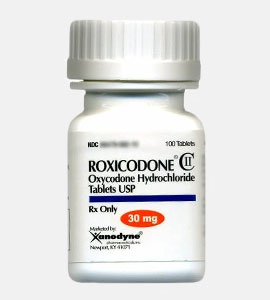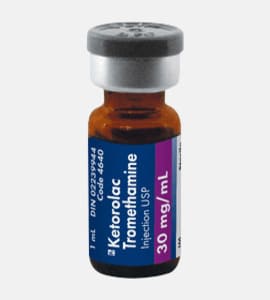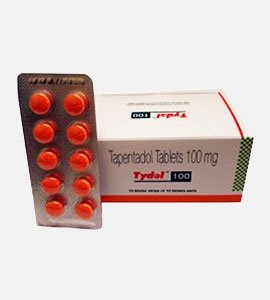Uses of Roxicodone
Oxycodone is a prescription medicine used to treat moderate to severe pain.
This medication may be prescribed for other uses. Ask your doctor or pharmacist for more information.
Side Effects of Roxicodone
Common side effects include:
• nausea
• constipation
• vomiting
• headache
• itching
This is not a complete list of oxycodone side effects. Ask your doctor or pharmacist for more information.
Roxicodone Interactions
Tell your healthcare provider about all the medicines you take, including prescription and non-prescription medicines, vitamins, and herbal supplements. Be especially careful about taking other medicines that make you sleepy such as:
• pain medicines
• sleeping pills
• anxiety medicines
• antihistamines
• anti-depressants
• tranquilizers
• anti-nausea medicine
• alcohol
This is not a complete list of oxycodone drug interactions. Ask your doctor or pharmacist for more information.
Roxicodone Precautions
Do not drive, operate heavy machinery, or participate in any other possibly dangerous activities until you know how you react to this medicine. This medication can make you sleepy.
Do not drink alcohol while using oxycodone. It may increase the chance of getting dangerous side effects.
Do not take other medicines without your doctor’s approval. Other medicines include prescription and non-prescription medicines, vitamins, and supplements. Be especially careful about products that make you sleepy.
Do not take oxycodone if:
• your doctor did not prescribe it for you
• are allergic to any of its ingredients
• have had a severe allergic reaction to a medicine that contains oxycodone. Ask your healthcare provider if you are not sure.
• are having an asthma attack or have severe asthma, trouble breathing, or any lung problems
• have a bowel blockage called paralytic ileus
• have recently had a head injury
• you have a history of drug or alcohol dependence
• you have had a severe allergic reaction to codeine, hydrocodone, dihydrocodeine, or oxycodone (such as Tylox, Tylenol with Codeine, or Vicodin). A severe allergic reaction includes a severe rash, hives, breathing problems, or dizziness.
Oxycodone can cause serious breathing problems that can become life-threatening, especially if oxycodone is used the wrong way. Call your healthcare provider or get medical help right away if:
• your breathing slows down
• you have shallow breathing (little chest movement with breathing)
• you feel faint, dizzy, confused, or
• you have any other unusual symptoms
Oxycodone can cause your blood pressure to drop. This can make you feel dizzy and faint if you get up too fast from sitting or lying down. Low blood pressure is also more likely to happen if you take other medicines that can also lower your blood pressure. Severe low blood pressure can happen if you lost blood or take certain other medicines.
There is a chance of abuse or addiction with oxycodone. The chance is higher if you are or have been addicted to or abused other medicines, street drugs, or alcohol, or if you have a history of mental problems.
Roxicodone Food Interactions
Grapefruit and grapefruit juice may interact with oxycodone and lead to potentially dangerous effects. Discuss the use of grapefruit products with your doctor.
Tell your doctor if you:
• have trouble breathing or lung problems
• have had a head injury
• have liver or kidney problems
• have adrenal gland problems, such as Addison's disease
• have severe scoliosis that affects your breathing
• have thyroid problems
• have enlargement of your prostate or a urethral stricture
• have or had convulsions or seizures
• have a past or present drinking problem or alcoholism
• have hallucinations or other severe mental problems
• have past or present substance abuse or drug addiction
• have any other medical conditions
• are pregnant or plan to become pregnant
• are breastfeeding
Tell your healthcare provider about all the medicines you take, including prescription and non-prescription medicines, vitamins, and herbal supplements.
Roxicodone and Pregnancy
Tell your doctor if you are pregnant or plan to become pregnant.
The FDA categorizes medications based on safety for use during pregnancy. Five categories - A, B, C, D, and X, are used to classify the possible risks to an unborn baby when a medication is taken during pregnancy.
Oxycodone falls into category B. There are no well-done studies that have been done in humans with oxycodone. But in animal studies, pregnant animals were given this medication, and the babies did not show any medical issues related to this medication.
Roxicodone and Lactation
Oxycodone has been detected in human breast milk. Because of the possibility for adverse reactions in nursing infants from oxycodone, a choice should be made whether to stop nursing or to stop the use of this medication. The importance of the drug to the mother should be considered.


 English
English
 Français
Français
 Deutsch
Deutsch
 Italiano
Italiano
 Español
Español
 العربية
العربية
 Čeština
Čeština
 NZD
NZD



















